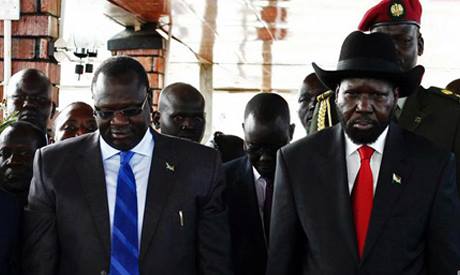The UN Security Council on Wednesday imposed sanctions on six commanders from South Sudan, the first to be blacklisted in a country where 18 months of war have brought horrific violence.
 The UN Security Council on Wednesday imposed sanctions on six commanders from South Sudan, the first to be blacklisted in a country where 18 months of war have brought horrific violence.
The UN Security Council on Wednesday imposed sanctions on six commanders from South Sudan, the first to be blacklisted in a country where 18 months of war have brought horrific violence.
The six generals - three from the government forces and three from the opposition - were punished with a global travel ban and an assets freeze for their role in the worsening conflict.
Britain, France and the United States had put forward the six names to a newly formed sanctions committee that was set up in March by the Security Council after a string of failed successive ceasefires.
From the government side, the three are: Major General Marial Chanuong Yol Mangok, commander of President Salva Kiir's presidential guard; Lieutenant General Gabriel Jok Riak, whose forces are fighting in Unity State; and Major General Santino Deng Wol, who led an offensive through Unity State in May in which children, women and old men were killed.
From the opposition, the sanctions target Major General Simon Gatwech Dual, chief of the general staff, Major General James Koang Chuol who led attacks in Upper Nile State, and General Peter Gadet, the opposition deputy chief of staff for operations.
"As the members of the Security Council demonstrated today, those who commit atrocities and undermine peace will face consequences," US Ambassador Samantha Power said in a statement.
Power called on both sides to "put aside their self-serving ambitions, end the fighting, and engage in negotiations to establish a transitional government."
She warned that additional sanctions could be imposed.
The UN committee had set a 1900 GMT deadline for objections to be raised to the sanctions request amid some expectation that Russia and China could refuse to endorse the move.
But the deadline passed without objections, which means under UN rules that the request was approved.
Russia said it decided to back sanctions because the African Union had come out in support of the move.
"Still we consider the sanctions counterproductive as they do not contribute to the peace process," said Alexey Zaytsev, spokesman for the Russian mission.
The International Crisis Group had come out against the sanctions proposal, arguing that the six generals were not responsible for the failure to reach an agreement and warning that their support for any future deal could be jeopardized.
South Sudan has been torn by fighting since December 2013 between forces loyal to Kiir and rebels allied with his former deputy, Riek Machar, and the violence has imploded along ethnic lines.